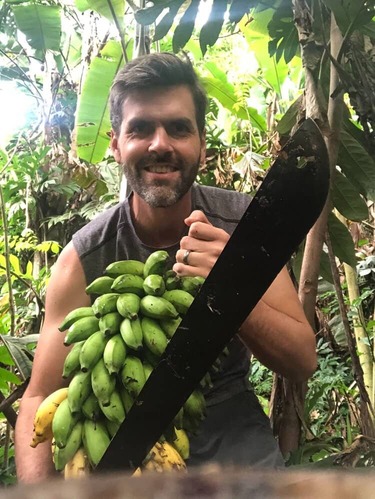We use cookies on our website.
Some of them are necessary for the functioning of the site, but you can decide about others.
ABB expands residential portfolio with acquisition of Lumin. Learn more.
ABB expands residential portfolio with acquisition of Lumin. Learn more.

After penning this post, Jeff went out in search of Mofongo ingredients.
My Lumin business cards read "Jeff Nicholson, Caribbean Applications Specialist." That's the best job title I've ever had and it describes my role within Lumin nicely. I spend a good amount of my time wondering how to answer the question, "Is Lumin good?"
I do that by thinking through the ways our product can be even more useful, while fielding customer support calls, ensuring compliance with the National Electric Code and other standards, and participating in discussions about how the Lumin Smart Panel can be used in new and innovative ways. The Caribbean part of my title is even more exciting though. I'm lucky enough to live in beautiful Puerto Rico, where I can provide in-person installation support for our Caribbean-based Certified Installers, and where I'm in a position to best understand the unique energy situation faced by these amazing but isolated islands.
The Caribbean region contains more than 700 islands, with an amazing array of cultures and languages. They range from tiny, rugged-but-populated outcroppings like the island of Saba, which is barely big enough for one of the shortest runways in the world, to islands like Cuba, which is almost 600 miles long and nearly the size of Florida.
One thing they all have in common is physical isolation from the continents. That can be a good thing; it's nice to be far away from some of the noise and hurry of the mainland. Island time is a real thing and it's wonderful to live in a place that values time over money. The isolation also has given each island a distinct and rich cultural identity that the people of the Caribbean are rightly proud of. Living in isolated paradises in the 21st century also comes with challenges. Few of the islands produce much of their own food, and only Trinidad and Tobago have enough petroleum reserves to be energy independent. In Haiti, only 30% of the country is reached by the electrical grid. The US Virgin Islands have some of the most expensive electricity in the world at $0.47/kWh. We import almost everything that we consume on the islands and supply chains can be tenuous.
Disasters like the 2010 earthquake in Haiti, Hurricane Maria in Puerto Rico, and Hurricane Dorian in the Bahamas were magnified in their destruction by isolation. Indispensable help arrived from the mainland, but it wasn't fast enough or substantial enough. In the wake of these calamities, interest in local food production and renewable energy has skyrocketed. Caribbean islanders have come to realize that when disaster strikes we are, in large part, on our own. This realization is ever more clear in the face of the Coronavirus crisis. Puerto Rico instituted a nearly complete lockdown of the entire island before any US states followed suit. The Dominican Republic closed itself off from land, sea, and air travel after one COVID-19 death. Cuba is working hard on its own treatments and a vaccine, and is sending nurses to help in neighboring Jamaica.
As I write this, friends and neighbors are falling ill and there are no tests and no forms of treatment available to them. We know we are on our own, so we take our own measures to control things like this. This will pass, eventually. It will last much longer than we expect, harm people we care about, and put many of us in a frightening financial situation. But it will pass. When it does the world will probably look very different. I imagine it will be a world that looks a lot more like the islands of the Caribbean. A world that understands that the systems we've come to depend on are not as reliable as they may seem and that the unexpected can happen to anyone. Over the past few weeks, there have been moments when I wished I was a doctor or a nurse so that I could be doing something proactive to help. I'm not, so like most of us, I'm at home doing my part to stay out of the way of the virus and the people trying to stop it.
I feel grateful to have great camaraderie with my Lumin colleagues and fortunate to have work I can do online. The folks at Lumin HQ in Virginia are now working from home, joining with those of us who work remotely in Puerto Rico, Colorado, and California. We haven't stopped making the product even better and getting it into the hands of more customers. The Lumin Smart Panel won't cure COVID-19. But it will be there when this all passes, as a part of the self-reliant distributed energy economy that will likely become ever more important in a world that will have to rebuild itself into something new. Something that looks more like the Caribbean. Jeff Nicholson is Lumin's Caribbean Applications Specialist and the only one of us who regularly uses a machete to make dinner.